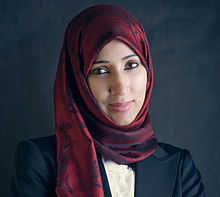Women in Saudi Arabia

Manal al-Sharif, a women's rights activist from Saudi Arabia who helped start a women's right to drive campaign in 2011.
|
|
| Gender Inequality Index | |
|---|---|
| Value | 0.284 (2014) |
| Rank | 56th out of 157 |
| Maternal mortality (per 100,000) | 12 (2015) |
| Women in parliament | 19.9% (2014) |
| Females over 25 with secondary education | 60.5% (2014) |
| Women in labour force | 13% (2015) |
| Global Gender Gap Index | |
| Value | 0.583 (2016) |
| Rank | 141st out of 144 |
Women's rights in Saudi Arabia are limited in comparison to many of its neighbors. The World Economic Forum's 2016 Global Gender Gap Report ranked Saudi Arabia 141 out of 144 countries for gender parity, down from 134 out of 145 in 2015. The United Nations Economic and Social Council (ECOSOC) elected Saudi Arabia on the U.N. Commission on the Status of Women for 2018–2022. Women in Saudi Arabia constitute 13% of the country's native workforce as of 2015.
However, women's status has changed in recent decades. Women were previously forbidden from voting or being elected to political office, but in 2011 King Abdullah let women vote in the 2015 local elections, as well as to be appointed to the Consultative Assembly. There are more female university graduates in Saudi Arabia than male, and female literacy is estimated to be 91%, which while still lower than male literacy is far higher than it was 40 years ago. The average age at first marriage among Saudi females is 25 years.
Many conservative Saudi women do not support loosening traditional gender roles and restrictions, on the grounds that Saudi Arabia is the closest thing to an "ideal and pure Islamic nation," and under threat from "imported Western values".
Among the factors that define rights for women in Saudi are government laws, the Hanbali and Wahhabi interpretation of Sunni Islam, and traditional customs of the Arabian Peninsula. In 2017, King Salman ordered that women be allowed access to government services such as education and healthcare without the need of consent of her guardian.
Gender roles in Saudi society come from Sharia (Islamic law). Sharia law has derivatives from the Quran and hadith. In Saudi culture, the Sharia is interpreted according to a strict Sunni form known as the way of the Salaf (righteous predecessors) or Wahhabism. The law is mostly unwritten, leaving judges with significant discretionary power which they usually exercise in favor of tribal traditions.
...
Wikipedia
